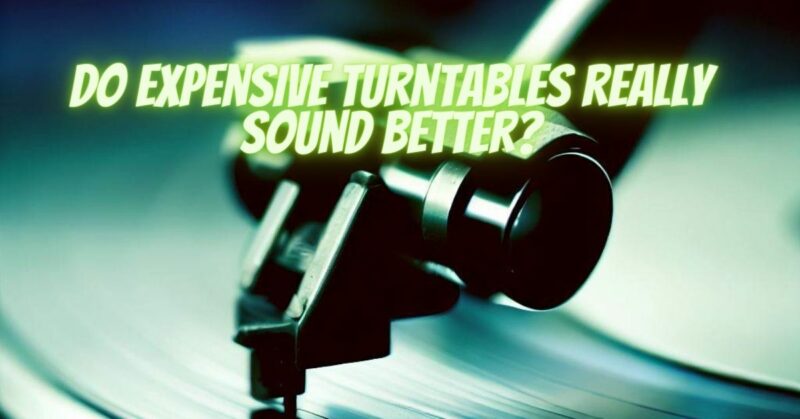The world of audio equipment is filled with choices ranging from budget-friendly options to high-end, premium products. When it comes to turntables, there’s a common belief that spending more money equates to better sound quality. But is this always the case? This article delves into the factors influencing the sonic performance of turntables, the differences between budget and expensive models, and whether the price tag truly reflects sound quality.
Understanding Turntable Components and Sound Quality
- Turntable Components:
- Platter: The rotating platform where the record sits.
- Tonearm: The arm that holds the cartridge/stylus and allows it to track the record grooves.
- Cartridge and Stylus: The component responsible for reading the grooves and translating them into an electrical signal.
- Motor: The mechanism that drives the platter’s rotation.
- Build Quality: The materials and construction methods used in each component can significantly affect sound quality.
- Impact on Sound Quality:
- Speed Stability: A stable motor ensures consistent rotation speed, preventing pitch variations.
- Vibration Control: High-quality materials and isolation mechanisms minimize vibrations, reducing interference with the stylus’ tracking ability.
- Tonearm Rigidity: A rigid, well-designed tonearm reduces resonance and allows for precise tracking of the record grooves.
- Cartridge Quality: The cartridge and stylus’ accuracy and fidelity play a crucial role in reproducing the nuances of the music.
Factors Influencing Price Disparity
- Build Materials and Quality:
- Premium Materials: Expensive turntables often feature high-grade materials such as aluminum, carbon fiber, and high-density polymers, which offer superior vibration damping and rigidity.
- Precision Engineering: The precision and craftsmanship involved in manufacturing premium turntables contribute to their higher cost. Tighter tolerances and meticulous assembly result in more consistent performance.
- Advanced Features and Technology:
- Motor Control: Expensive turntables may utilize advanced motor control systems, such as direct drive or servo-controlled motors, to achieve precise speed stability.
- Isolation and Damping: Sophisticated isolation feet, plinth designs, and suspension systems isolate the turntable from external vibrations, further enhancing sound quality.
- Tonearm Design: High-end turntables often feature custom-designed tonearms with advanced bearings and damping mechanisms for optimal tracking and resonance control.
- Brand Reputation and Exclusivity:
- Legacy and Prestige: Established brands with a long history of producing high-quality audio equipment often command higher prices due to their reputation and legacy.
- Limited Editions and Customization: Limited edition models and custom-built turntables cater to enthusiasts willing to pay a premium for exclusivity and customization options.
Evaluating Sound Quality vs. Price
- Subjective Nature of Sound:
- Listener Preferences: Sound quality is subjective and influenced by individual preferences, listening environments, and personal taste.
- Diminishing Returns: The law of diminishing returns suggests that beyond a certain price point, the improvements in sound quality may be marginal compared to the increase in cost.
- Value Proposition:
- Performance vs. Cost: Expensive turntables may offer incremental improvements in sound quality compared to budget models, but whether these improvements justify the higher cost is subjective and depends on individual priorities.
- Consideration of Budget: For some enthusiasts, investing in an expensive turntable is a worthwhile pursuit, while others may find that a mid-range or budget option meets their needs adequately.
While expensive turntables often offer superior build quality, advanced features, and exquisite craftsmanship, whether they sound significantly better than budget models is a matter of debate. Factors such as build materials, engineering design, and brand reputation contribute to the higher cost of premium turntables. However, the relationship between price and sound quality is not always linear, and diminishing returns may apply.
Ultimately, the decision to invest in an expensive turntable should be based on careful consideration of individual preferences, budget constraints, and the perceived value proposition. Audiophiles seeking the utmost in sonic performance and build quality may find that the investment is justified, while others may find that a well-chosen budget or mid-range turntable provides a satisfactory listening experience without breaking the bank. Regardless of price, the joy of vinyl playback lies in the music itself, and the best turntable is one that brings you closer to the music you love.

